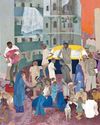
BADRI
In May of 2019, my parents and I were in Goa on holiday. At around one in the afternoon, we stopped at a Dhaba for lunch. A young boy, around 11 or 12 years old, came up to take our order. I asked him his name and, in a soft voice, he replied “Badri”. I thought ruefully about how this sweet, innocent little kid had to shoulder responsibilities when he should be out learning at school, climbing trees and playing with marbles.
We were served our food shortly. As we were eating, a large man with a long beard entered the dhaba. He was clearly drunk, unsteady on his feet, and slurring his words. Badri went up to do his job—slowly, unsure of himself. The man pulled the boy towards him roughly and rattled off his food order in loud, incomprehensible words. Hesitant, Badri took the order and scurried into the kitchen. A few minutes later, the man began to get impatient and grumbled aggressively. Badri emerged hurriedly, laden with plates, and started serving the man, but in his nervous rush, he let slip a glass of water, which crashed to the floor, spilling on to the irate customer.
Furious, the man bolted up from his seat, and raised his hand to strike the boy. A terrified Badri cowered in tears before him. I knew somebody should intervene but felt uncertain and even afraid of the inebriated man’s streak of violence. The other diners were, by then, watching the scene unfold. The other staff seemed unconcerned— the cashier looked on vacantly; the cook never emerged from indoors.
This story is from the {{IssueName}} edition of {{MagazineName}}.
Start your 7-day Magzter GOLD free trial to access thousands of curated premium stories, and 9,000+ magazines and newspapers.
Already a subscriber ? Sign In
This story is from the {{IssueName}} edition of {{MagazineName}}.
Start your 7-day Magzter GOLD free trial to access thousands of curated premium stories, and 9,000+ magazines and newspapers.
Already a subscriber? Sign In

BOOKS
Books review

STUDIO - Off Lamington Road by Gieve Patel
Oil on Canvas, 54 x 88 in

NEWS FROM THE WORLD OF MEDICINE
FOODS THAT FIGHT DEMENTIA

TO HELL AND BACK
The Darvaza crater in Turkmenistan is known as the Gates of Hell. I stood on its edge - and lived to tell the tale

THE SNAKE CHARMERS
Invasive Burmese pythons are squeezing the life out of Florida's vast Everglades. An unlikely sisterhood is taking them on

Sisterhood to Last a Lifetime
These college pals teach a master class in how to maintain a friendship for 50-plus years

...TO DIE ON A HOCKEY RINK
ONE MINUTE I WAS PLAYING IN MY BEER LEAGUE, THE NEXT I WAS IN THE HOSPITAL

Just Sit Tight
Broken, battered and trapped in a ravine for days, I desperate driver wonders, \"Will anyone find me?\"

Allow Me to Mansplain...
If there's one thing we know, it's this: We're a nation of know-it-alls

THE BITTER TRUTH ABOUT SUGAR (AND SUGAR SUBSTITUTES!)
It's no secret that we have a serious addiction. Here's how to cut back on the sweet stuff, once and for all.